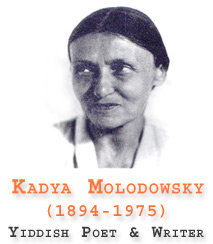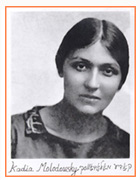|
JHOM - Kadya Molodowsky

Kadya Molodowsky (1894-1975) published six major books of poetry in Yiddish,
including the children’s poems for which is she best known today, as well
as fiction, plays and essays. She participated in nearly every aspect of Yiddish
literary culture that existed in her lifetime, first in Poland, where she lived
until 1935, when she emigrated, and then in America, where she lived until her
death.
Before her emigration, Molodowsky taught young children in the Yiddish schools
of Warsaw. In New York City, she supported herself by writing for the Yiddish
press and founded a literary journal, Svive (Surroundings), which she
edited for nearly thirty years. In 1971, she was awarded the Itzik Manger Prize,
the most prestigious award in the world of Yiddish letters, for her achievement
in poetry.
|

Kadya Molodowsky as a young
woman |
|
Molodowsky was one of the few Yiddish women poets able to sustain and develop
her writings throughout her life. She published continuously from 1927 until
1974. All her books, both poetry and prose, reflect the cultural and historical
changes that the author experienced. But the poetry in particular evinces the
often contradictory influences of the cultures among which Molodowsky lives
– the Russian symbolists, the Yiddish modernists (and through them, modern
American and European poetry), the Hebrew Bible, rabbinic writings, Yiddish
prayers for women, social protest poetry, modern drama, and world folk- and
classical lore.
Although the distinctive voice that emerged from this confluence of cultures
addressed the same social issues that concerned her contemporaries, it was given
its particular force by Molodowsky’s immediate and intense focus on women’s
lives and works. Because of this focus, Molodowsky’s poems reshape the
questions the pervaded modern Yiddish poetry: questions about the poet’s
political responsibility, national identity, religious belief, aestheticism,
and individualism.
The themes of her poems are often polemical, but they bring the compressed
intensity of the lyric to the expansive forms of the meditation, the narrative,
and the poetic sequences. Molodowsky’s poems play constantly yet unexpectedly
upon the Yiddish language – its musicality, emotional complexity, and
mélange of dictions. They also encompass the folk idioms, the learned
rabbinic phrases, crass Americanisms and neologisms, political clichés,
and literary affectations. As a result, the poems have a deliberate self-consciousness
that exposes the poet to her own merciless gaze.
As Molodowsky developed, her poetry came to embody the conflicts within her
life. A woman with modernist sensibilities, a Jew thrown into crisis by secularism,
an intellectual enraged by social injustice but wary of ideology, Molodowsky
wrote in a tradition that was not always sympathetic to her sexual identity,
her religious feelings, or her poetic politics.
 |
 From:
Kathryn Hellerstein, translator, editor, commentator, Paper Bridges:
Selected Poems of Kadya Molodowsky (Detroit: Wayne State University
Press, 1999) From:
Kathryn Hellerstein, translator, editor, commentator, Paper Bridges:
Selected Poems of Kadya Molodowsky (Detroit: Wayne State University
Press, 1999) |
 |
The
Shofar Blower, by Kadya Molodowsky |
|



